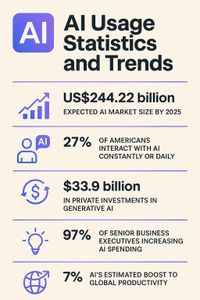Artificial Intelligence (AI) is no longer just a futuristic concept; it has become a transformative force reshaping industries, developer workflows, and enterprise strategies worldwide. As we move deeper into 2025, the rapid expansion of AI technologies, particularly generative AI and large language models (LLMs), is driving unprecedented changes in how applications are built, businesses operate, and workforces evolve.
Developers stand at the forefront of this revolution. AI is fundamentally altering software development, offering new opportunities to infuse applications with powerful generative AI capabilities. According to recent industry insights, the evolution from simple AI-assisted code suggestions to sophisticated "agentic workflows" is remarkable. These AI assistants now act as peer programmers, capable of performing wide-ranging coding tasks such as adding and editing files, managing dependencies, running scripts, and installing tools—all while humans remain in control. This shift promises to redefine the developer landscape over the next decade, dramatically boosting productivity and streamlining workflows.
Central to maximizing AI’s potential in development is the concept of context and customization. AI models thrive on context; without it, they risk producing generic or irrelevant outputs. The Model Context Protocol (MCP), developed by Anthropic, is a breakthrough in this regard. MCP standardizes how applications provide context to AI LLMs, creating a common language for exchanging information securely between AI models and data sources. This enables AI agents to leverage domain-specific knowledge effectively, improving their ability to perform complex developer tasks with confidence.
Developers can enhance AI performance further by supplying comprehensive context from entire codebases, including code comments, pull request messages, and terminal commands. The more examples AI can access, the better it can respond to prompts, especially when directed to consult the latest updated content. Moreover, developers now enjoy a growing array of AI tools and models, such as GitHub Copilot, Cursor, Claude Code, GPT-4o, Gemini 2.0 Flash, and Claude Sonnet 3.5/3.7, allowing them to select the best fit for specific tasks and integrate AI seamlessly into various IDEs like VS Code, Visual Studio, Rider, and Xcode.
Customization extends beyond context to include personalizing AI responses based on team preferences. Instruction sets—often simple text files—can tailor AI behavior to align with coding standards, tone, and naming conventions. This personalization ensures AI tools not only increase efficiency but also conform to unique organizational workflows.
While developers are embracing AI, enterprises are rapidly adopting generative AI and LLMs as strategic necessities. Kong Research’s 2025 Enterprise LLM Adoption Report surveyed 550 IT leaders, software developers, and engineers, revealing that 72% of organizations expect to increase spending on LLMs this year, with nearly 40% already investing over $250,000 annually. Google leads enterprise adoption, with 69% of respondents using its AI models—surpassing OpenAI’s 55% usage—thanks to aggressive integration strategies like embedding Gemini into Google Workspace.
Enterprise preferences lean toward paid or enterprise-grade AI models, with 63% opting for these over free versions, signaling a mature market approach. Hybrid strategies combining proprietary and open-source models are gaining traction, embraced by 37% of enterprises recognizing that no single model meets all needs. Open-source models are especially popular, with 51% of respondents believing they currently outperform or will eventually surpass proprietary solutions.
Security and privacy remain paramount concerns, cited by over 44% of respondents as significant barriers to wider LLM adoption. Budget constraints also pose challenges, with 24% identifying costs as their most critical hurdle. Despite these issues, enterprises express optimism about AI’s impact, with 82% confident it will boost productivity, innovation, and career opportunities. Only 11% anticipate AI-induced layoffs, reflecting a growing belief that AI will augment rather than replace human roles.
The business world is witnessing explosive growth in AI investment and adoption. The global AI market is projected to reach $244.22 billion by 2025 and soar to $1.81 trillion by 2030, with spending expected to hit $360 billion in 2025 and $480 billion in 2026. Generative AI alone attracted $33.9 billion in private investments in 2024, marking an 18.7% increase from the previous year. Venture capital funding for AI startups surged 52% in 2024 to $131.5 billion, underscoring investor confidence.
AI’s influence extends deeply into workplace productivity. Studies show generative AI can boost highly skilled workers’ performance by nearly 40% and increase business users’ throughput by an average of 66%. Programmers using AI reportedly code 126% more projects weekly, while sales professionals save over two hours daily thanks to AI and automation tools. Across industries—from mining and agriculture to finance and cybersecurity—AI adoption is accelerating, with 78% of organizations using AI in at least one business function.
However, challenges remain. A significant skills gap exists, with only 12% of IT professionals possessing the necessary expertise to use AI effectively, despite 81% believing they can. Ethical concerns, data privacy, and security issues weigh heavily on decision-makers, with 80% expressing worries about data protection. Customer sentiment is mixed; 64% prefer human interaction over AI in customer service, and AI-related terminology can reduce purchase intent. Trust in AI training data is low, with 54% of users skeptical about its reliability.
Geopolitical dynamics also shape AI’s evolution. China leads in AI patent volume, granting nearly 13,000 patents, but the U.S. dominates in patent impact, with American patents cited nearly seven times more frequently. Meanwhile, enterprises are increasingly open to international AI providers, such as DeepSeek, with 17% adopting their models and 80% comfortable using them at work.
Amid this dynamic landscape, industry leaders like Alithya Group are highlighting AI as a top priority across critical sectors such as manufacturing, healthcare, and financial services. Their 2025 Industry Trends Reports emphasize AI’s central role in shaping business conditions over the next year, reflecting a broader consensus that AI integration is essential for competitiveness.
Looking ahead, AI adoption will require strategic planning and realistic expectations. Success lies in focusing on specific, measurable use cases that deliver immediate productivity gains rather than chasing broad, unfocused transformations. Balancing investment with clear ROI, addressing security and privacy concerns, and developing AI skills are crucial steps for organizations aiming to harness AI’s full potential.
As AI continues to mature and embed itself into the fabric of business and development, it is clear that its impact will be profound and lasting. The journey from cautious curiosity to strategic necessity is well underway, and those who navigate this transition thoughtfully stand to reap significant rewards.





